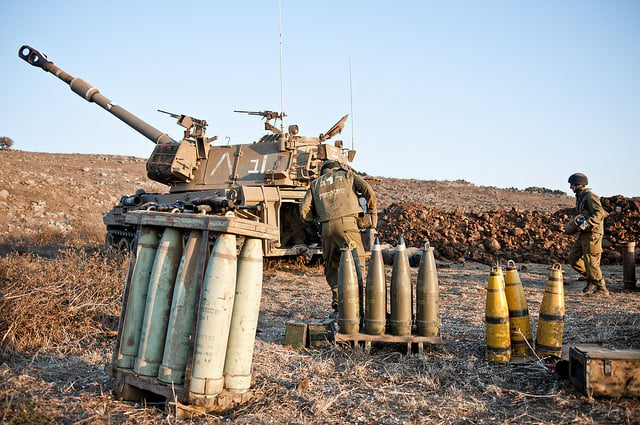This includes a variety of arms, from Iron Dome interceptors to sophisticated guided air-to-ground munitions and artillery shells.
By Yaakov Lappin, JNS
In the wake of the ongoing war against Hamas and its exposure of Israel’s near total dependence on the United States to replenish its stocks of ammunition, Israel has begun shifting toward greater domestic ammunition production.
The Israeli Defense Ministry has begun reaching out to local defense companies to boost production lines and place orders that will ensure they churn out ammunition for years to come, as a top priority.
The ministry saw domestic production as a priority even before the war, but the issue has now risen to the top of the national agenda.
“The lesson from the war in Ukraine and against Hamas is identical: Israel must significantly increase the arsenal with which it enters the campaign,” a former defense official told JNS.
This includes a variety of arms, ranging from Iron Dome interceptors to sophisticated guided air-to-ground munitions and artillery shells. Tank shells could also be a candidate for domestic production.
Yet not everything can be moved to Israel. Military aircraft will continue to be made in the United States.
The cost of producing aircraft for a single military without exporting them to additional clients would make their production a financial non-starter for Israeli defense industries. Nor would the U.S. agree for Israel to begin competing with it in the global fighter aircraft market, as the 1980s Lavi jet project, which shut down for these reasons, demonstrated.
On Jan. 25, ministry director-general Maj. Gen. (res.) Eyal Zamir concluded a working visit to Washington, D.C., where he met with senior U.S. Department of Defense and State Department leadership, as well as with Lockheed Martin and Boeing executives.
Those two companies produce the Israeli Air Force’s growing fleet—F-35s, CH53 transport helicopters, Apache helicopters and F-15s. Israel is reportedly attempting to fast-track some of those deliveries, particularly the Apaches.
“The visit underscored the close cooperation between Israel and the United States since the beginning of the ongoing Swords of Iron war,” the ministry said in a statement at the time. “Maj. Gen. (res.) Zamir engaged in discussions with his American counterparts about armament procurement, aligning with preparations for evolving combat scenarios. The discussions also focused on plans for force build-up in the upcoming multi-year strategy, including the acquisition of advanced platforms and capabilities to maintain the IDF’s qualitative military edge and readiness for diverse scenarios. This approach integrates lessons learned from the war into strategies for obtaining military equipment,” it stated.
Nevertheless, it has become painfully clear that Israel’s dependence on American ammunition supplies, which saw more than 200 cargo planes touch down Israel following Hamas’s Oct. 7 invasion, has become a danger to national security and independence.
This dependence means that any Israeli Cabinet must consider the principle of “legitimacy” in its warfare planning—a principle that could become paralyzing if leverage over Israel becomes too great.
Should that principle trickle down into operational decision-making, the result can only harm Israel’s war efforts.
IDF combat officers should be thinkingly purely about how to accomplish missions, while of course adhering to the IDF’s own internal ethical code and upholding its own internal commitment to adhering to the laws of armed conflict. But if concerns over “legitimacy” in the eyes of a foreign government, no matter how close an ally, creep in, due to ammunition reliance, that is a serious problem.
Furthermore, Israel’s current lack of independent mass ammunition production has meant that the IDF needs to weigh its uses of resources carefully in Gaza, when looking at multi-arena threats in the north and at Iran, both of which could become involved in full-scale wars at any time.
Such precaution means that the IDF has been running an “armament economy” regarding certain munitions.
Both the Air Force and the ground forces must take the prospects of additional fronts catching fire into account.
All of this means that mass domestic ammunition production is a must-have for Israel going forward, and there are encouraging signs that this is in fact what is developing.
This will also create very real economic burdens in the future; American ammunition was bought with U.S. aid money.
For Israel to create and fund new production lines among its defense industries, it will also need to ensure that society can manage this burden by having as many economically productive citizens in the work force as possible.
Israel at War with Hamas. Support Israel Today!
The people of Israel need your help at this most critical time. Please make a donation to help protect and defend Israelis against unprecedented Hamas terror.
Rockets are falling. Sirens blare, with seconds to run for cover. IDF soldiers risk their lives battling terrorists inside Gaza. Thousands forced to abandon their homes in southern Israel.
To fight terror and save lives, UWI provides bomb shelters, anti-terror vehicles, protective gear, security equipment, medical assistance, relief to victims and much more. Help Israel fight and win this war against Hamas. The time to act is now!
